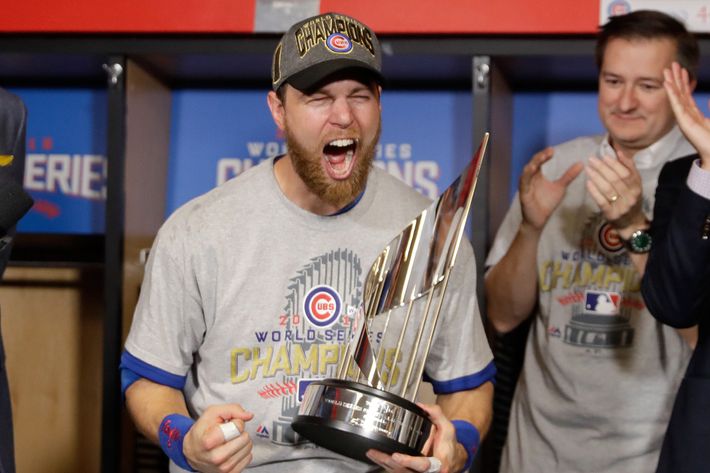
Late last night, the Chicago Cubs beat the Cleveland Indians in game seven of the World Series. They are lovable losers no more. The curse is broken. The victory, which caps off a comeback from being down three games to one in the Series, is now what “may be the sweetest and hardest-earned championship in the history of American sports.”
World Series MVP Ben Zobrist, who knocked the go-ahead hit in the top of the tenth, told the Chicago Tribune that the game almost made him pass out. “An epic battle,” said Zobrist, 35, favorite son of Eureka, Illinois. “I can’t believe that after 108 years, we’re able to hoist the trophy.”
It’s hard to put words to how meaningful this is to Cubs fans and Illinoisans and lovers of the game, and how to convey the feelings that are at the core of a hugging supernova that Cubs Nation is currently in the throes of. But philosophy, and its slightly more grounded sibling, psychology, provides a few windows.
The study of art helps put it into context: In The Meaning of the Body: Aesthetics of Human Understanding, University of Oregon philosopher Mark Johnson argues, following the tradition American pragmatist John Dewey, that the arts — painting, drama, film, literature — aren’t some trivial, impractical, and disconnected corner of human life, with the real action being in business and science. Rather, Johnson contends that art is so powerful because it takes the human experience to its most extreme places. “Art is not a distinct type of disinterested, non-practical experience that requires unique forms of judgment and evaluation,” he writes. “On the contrary, art matters because it provides a heightened, intensified, and highly integrated experience of meaning using all of our ordinary resources for meaning-making.”
It’s a similar point that screenplay guru Robert McKee makes in Story: If you’re going to ask for two hours of people’s time for a movie, you better take them to some extreme places within — or better yet, beyond — their usual emotional range. You can enter into the trance of a Monet or Mad Max and see and feel things you would never otherwise see — all without becoming a Parisian bon vivant or postapocalyptic antihero yourself. Art transports us, and takes us — in the safety of the museum or the theater or the text — into emotional states that are otherwise only accessible when your real life is in euphoria or crisis.
So too with sport: As evidenced by the madness on Twitter last night and the bedlam in Chicago, sports take one of the most basic qualities of human experiences — competition, which animates everything from capitalism to mating — and place it in the boundaries of a game. If you watched the whole game last night, you were treated to, and likely agonized by, extreme twists in the story arc — the Cubs are way ahead! No, they’re not! What is (Cubs manager) Joe Maddon doing! Oh my God, they won it! — that only a Hitchcock or a Hemingway could author. Yet no one mind was behind this, but dozens of elitely trained humans, locked in a ritualized, nonviolent battle.
Indeed, the Cubs victory is a sports story line put up to mythic proportions: It’s only in folk tales, faerie stories, and baseball that curses get lifted — and it’s beautiful evidence that, yes, personal and organizational transformation is possible. Ducklings turn to swans, frogs to princes, losers to champions. “For the Cubs, whose long history is riddled with the mythology of billy goat curses, black cats and a fan who was vilified for interfering with a foul ball, theirs is now a history of winning, and their identity changes forever,” quoth the Times. Through laughter, Zobrist, the Series MVP, marveled at his destiny: “I didn’t think that was a possibility for a little kid from Illinois,” he said. ”I just wanted to play the game and win. I was competitive, but I never thought that I would be in a situation like this.”

If you feel like you were a part of it — if you say “we won” after the Cubs victory — in a very real sense, you were and are. On one hand, fandom is a parasocial relationship, what psychologists call the one-sided connection that marks the “intimacy at a distance” that people have with celebrities. Very few Cubs fans know Zobrist personally, but that doesn’t mean that the relationships that flower around sports aren’t real.
As Eric Simons, author of The Secret Lives of Sports Fans: The Science of Sports Obsession, told the Seattle Times, “Fans get so much from identifying with a team, in ways even players don’t,” he said. “The athletes can be mercenaries, but the fan is permanent.” There are tons of psychological effects, lots of which have to with community: If you’re a Cubs fan, it’s hard to feel lonely or alienated right now. Experimental anthropologist Dimitris Xygalatas has found, through rigging up biomarker trackers to fire-walkers and the people who love them, that spectators of a high-stakes ritual — like a fire-walking ritual, or, presumably, the World Series — go through physiological states in synchrony. The more closely you identify with the participant, the more your interior states mirror theirs. It’s all a part of “collective effervescence,” the way that humans have synced together in ecstatic rhythm — in the crowd or on the dance floor — since time out of mind. Which, by the way, is the last time the Cubs won the Series.

